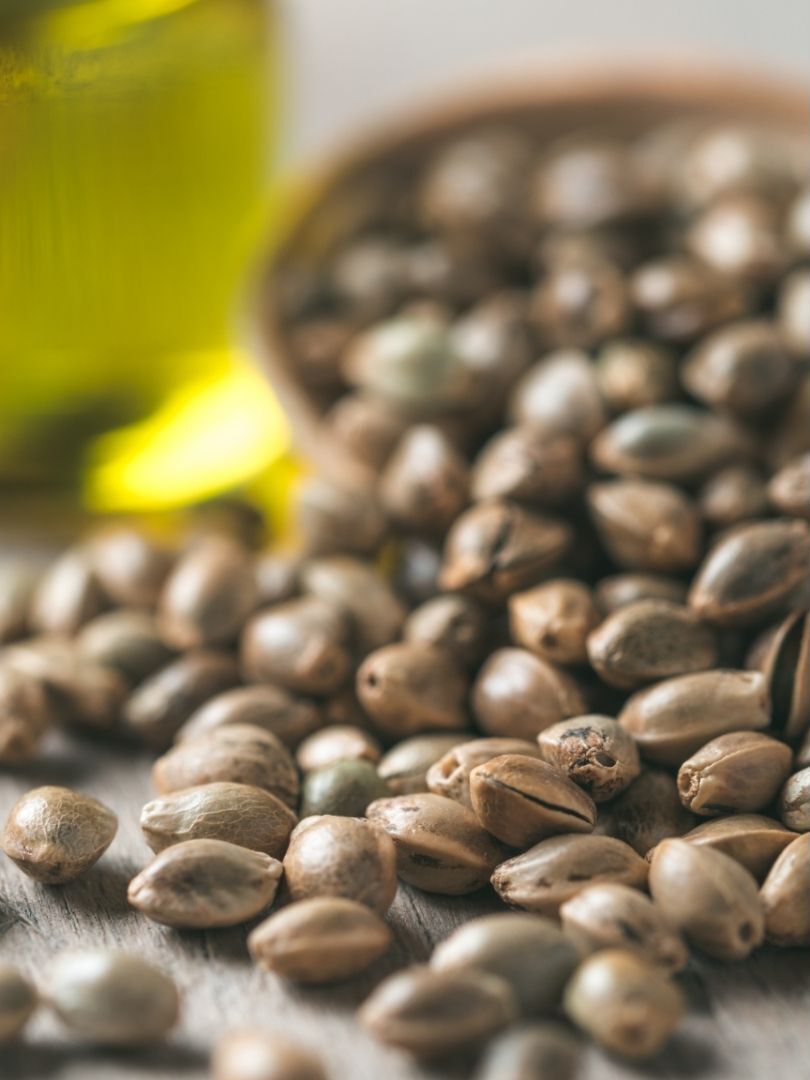

By now, we've all learned that essential oils are a necessary part of our routine if we want to keep our skin in tip-top shape. Clear skin, a brighter complexion, evened-out discoloration—there are a lot of purported benefits to incorporating an oil or two into our everyday skincare. From coconut to Moroccan oil, it seems that we've heard everything about every oil we need—until now. Allow us to introduce you to the next "It" oil in skin care: hemp seed oil.
We break down the benefits of hemp seed oil, from how great it is for dry skin to why we should mix it into a salad!
Keep reading for all you need to know about this multi-use ingredient...
What is Hemp Seed Oil?
Hemp seed oil—not to be confused with hemp oil, which is a blanket term for all oils that come from hemp and can include cannabidiol (CBD) oil—is made out of purely hemp seeds. CBD oil, in turn, is made from leaves, stalks, and flowers of hemp (and sometimes seeds as well). Hempseed Oil is the oil derived from the seeds of the hemp plant which is a cannabis plant cultivated for non-drug use. The oil is legal and used in large quantities for cosmetics, nutritional supplementation, and skin oils.
It can be legally used when it has a tetrahydrocannabinol (THC) content of less than 0.3 percent.
It can be marketed on its own or as an ingredient in moisturizing topicals. Make sure you know the difference between hemp seed oil and CBD oil. The latter absorbs into the skin and binds to cannabinoid receptors in the brain. It can have effects that are only beginning to be understood on anxiety, mood, sleep, and many other conditions. CBD can also have low levels of THC which has obvious psychoactive effects.
While other kinds of hemp oil are rich in cannabinoids as mentioned, hemp seed oil typically has no-to-few cannabinoids and contains mostly omega fatty acids. So, if you were worried about getting high off of hemp seed oil, you won't. You can already find it in a variety of skincare products, and you can even eat it.
Benefits of Hemp Seed Oil for Skin
Locks in hydration: Hemp seed oil is high in omega acids 3, 6, and 9, all of which help repair the skin barrier and form a seal over the skin to keep moisture trapped inside.
Attracts moisture: It is also a humectant, so it draws moisture to the skin," she says.
Anti-inflammatory: Those same omega acids in hemp seed oil also help lower inflammation in the skin.
Soothes skin: Hemp seed oil is rich in fatty acids, which help hydrate and soothe inflamed skin.
Anti-acneic: it may even modulate skin oil production, which is huge for people with acneic or overly oily skin.
How to Use It
Naturally, hemp seed oil is being integrated into plenty of beauty products as a hydrator and anti-inflammatory. In particular, use it with retinoids or after acids because it's so effective at staving off inflammation. It works wonders for redness and acne, too. It's pretty easy to know how much to apply—just use as much as you would any other oil.
Incorporating hemp seed oil into your diet is another major benefit to your skin because its nutrients are so good for your body. Try using raw hemp seeds in cooking, because they are in their natural state, so the body can absorb all the nutrients they offer most easily. Hemp seeds are great in salads, granolas, smoothies, and mixed in with grains, deliciously delivering vitamins A and E, but also essential trace minerals and a wealth of antioxidants.
It has a crispy, nutty taste and can be used on salads as a replacement for olive oil. It is high in omegas and full of essential amino acids that help make younger, smoother-looking skin and reduce inflammation in the body. Because it is a highly volatile oil, it must be kept refrigerated and not heated.
Bottom Line
Hemp seed oil is very versatile, but the morale of the story is that you can greatly benefit from it. For radiant, healthy skin, shop Wild Naturals featuring hemp seed oil and many other natural ingredients that will having you G-L-O-W-I-N-G!


